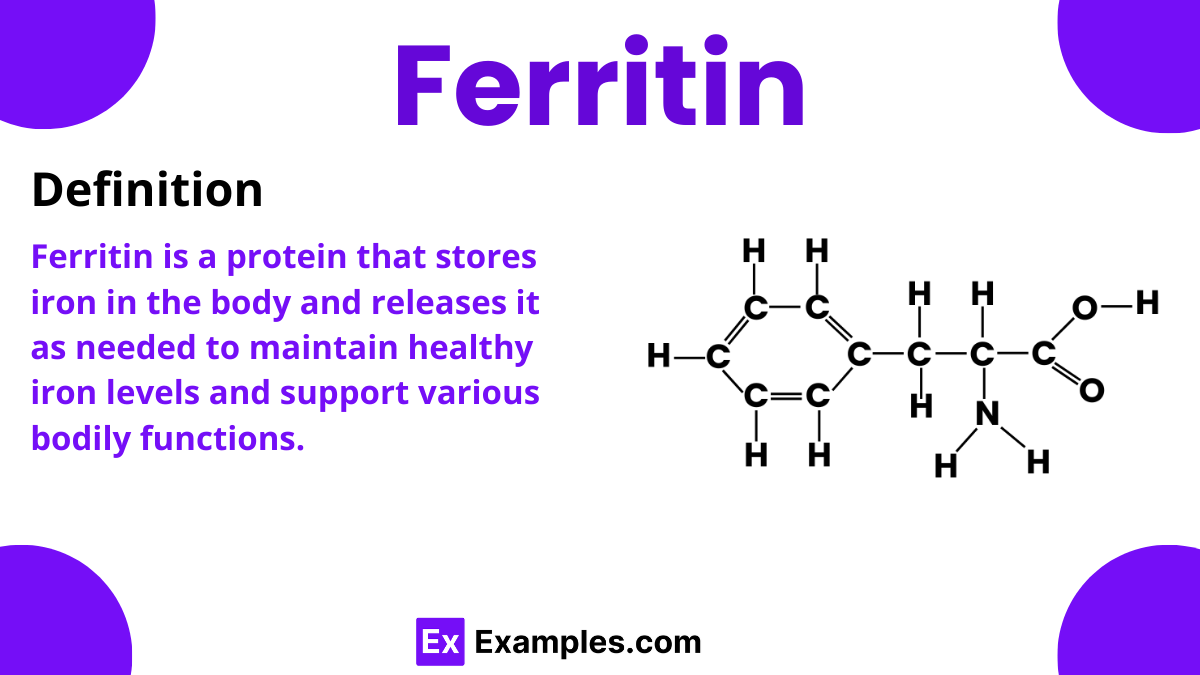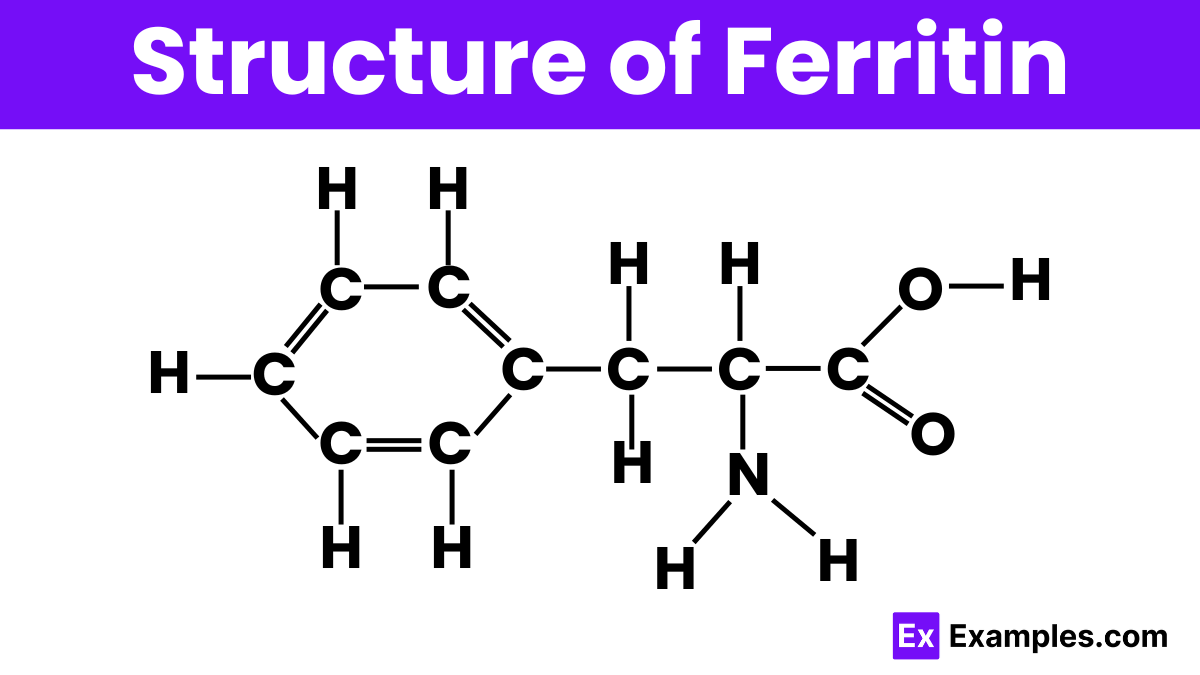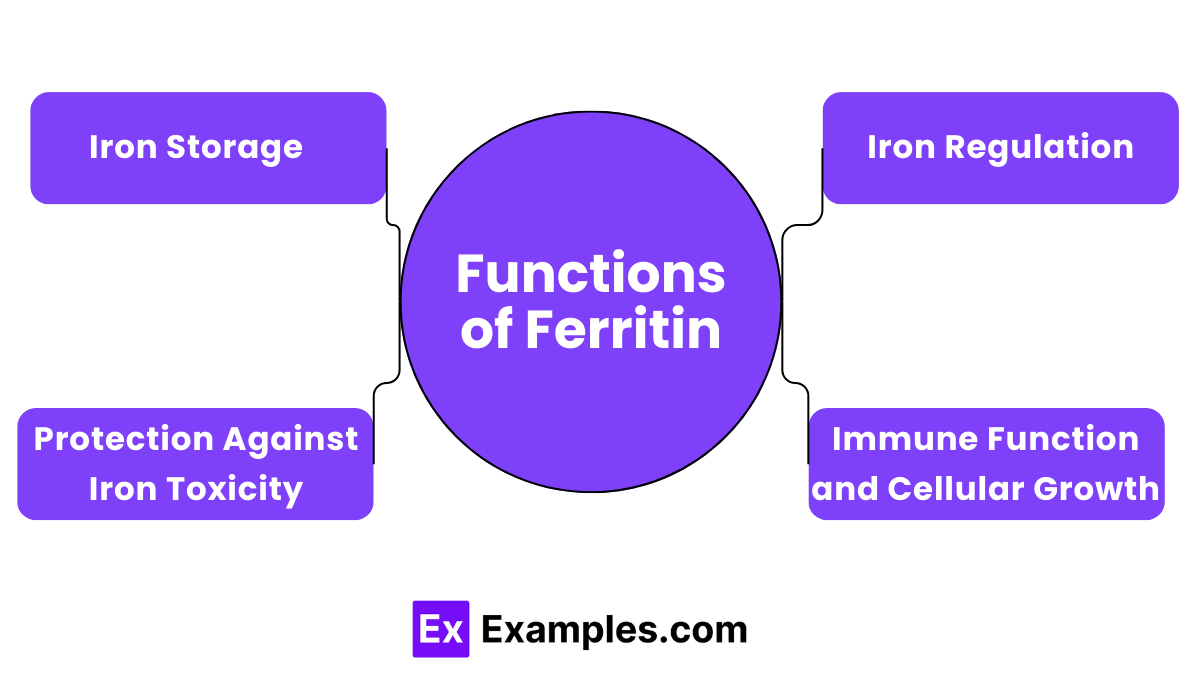What is the primary role of ferritin in the body?
To store calcium
To transport oxygen
To store iron
To break down carbohydrates


Ferritin is a fascinating complex compound in chemistry that serves as a storage unit for iron in your body. It acts like a tiny locker, safely holding onto iron until your body needs it to make red blood cells and keep you feeling energetic. Found in almost every living organism, from bacteria to humans, ferritin ensures that there’s a steady supply of iron available, which is crucial for many biological processes. Understanding ferritin can give us insights into how our bodies balance essential nutrients, highlighting its importance in health and disease management.

Ferritin is structured like a tiny, hollow sphere, which allows it to store up to 4,500 iron atoms inside. This sphere is made up of 24 protein subunits. Thus creating a shell that both protects and controls the release of iron as needed. The iron within ferritin is stored in the form of a mineral called ferrihydrite. Each subunit of the protein shell is intricately connected to others, forming a stable and efficient container for iron storage. This unique structure is essential for maintaining healthy iron levels in the body. And crucial for transporting oxygen and supporting cellular functions.

Ferritin primarily acts as a reservoir for iron. It stores iron securely and releases it when the body needs it, such as for producing hemoglobin. The molecule in red blood cells that carries oxygen.
By storing iron, ferritin helps regulate the body’s iron levels, ensuring they neither drop too low nor rise too high.
Ferritin protects the body’s cells from the harmful effects of free iron, which can generate harmful free radicals. These radicals can damage cellular structures including DNA.
Ferritin plays a role in immune response and cellular growth by managing iron’s availability, which is crucial for cell division and growth.
High ferritin levels in the body often indicate that there is an excess of iron stored in your cells, which could be a sign of conditions like hemochromatosis, where too much iron builds up in the body, or it could result from inflammation, liver disease, or infections. Elevated ferritin can also occur in response to certain types of anemia, where the body increases iron storage in an attempt to compensate for other issues. Monitoring ferritin levels is important because too much iron can lead to damage in organs like the heart and liver. Managing high ferritin typically involves medical evaluation and treatment to address the underlying cause of the iron imbalance.
Low ferritin levels indicate a shortage of iron in the body, often warning of iron deficiency anemia. This condition can cause symptoms like fatigue, weakness, and pale skin because iron is crucial for producing hemoglobin. Hemoglobin is the protein in red blood cells that carries oxygen throughout the body. Low ferritin can result from an iron-poor diet, excessive blood loss, or the body’s inability to absorb iron properly. It is important to identify and treat low ferritin to prevent more serious health issues and maintain energy and overall vitality.
If the body has no ferritin, it cannot store iron properly, leading to severe consequences. Without ferritin, iron would remain free in the bloodstream and body tissues, causing damage and increasing the risk of iron toxicity. This situation can disrupt the production of red blood cells, resulting in iron deficiency anemia, which makes it difficult for your blood to carry oxygen effectively. The lack of iron storage can compromise the immune system and reduce the body’s ability to fight infections and heal properly. Thus, ferritin is essential for maintaining balanced iron levels and overall health.
Foods like red meat, spinach, and lentils are excellent for boosting ferritin levels due to their high iron content.
No, ferritin is a protein that stores iron and releases it as needed. While iron is a mineral essential for health.
Yes, low ferritin can be more severe as it indicates depleted iron stores. This potentially leading to significant health issues before actual iron deficiency develops.
Text prompt
Add Tone
10 Examples of Public speaking
20 Examples of Gas lighting
What is the primary role of ferritin in the body?
To store calcium
To transport oxygen
To store iron
To break down carbohydrates
Where is ferritin predominantly found in the body?
Liver and muscles
Blood plasma
Skin and bones
Kidneys and intestines
Which condition is often indicated by low ferritin levels?
Iron deficiency anemia
High blood pressure
Diabetes
Hyperthyroidism
What is the effect of high ferritin levels in the blood?
It indicates iron deficiency
It suggests excess iron or inflammation
It implies a risk of heart disease
It signifies normal iron levels
Which of the following tests is commonly used to measure ferritin levels?
Complete blood count (CBC)
Serum ferritin test
Blood glucose test
Electrolyte panel
What is a possible cause of elevated ferritin levels besides iron overload?
Acute infection
Vitamin C deficiency
Chronic dehydration
High calcium intake
In which condition might ferritin levels be normal but still indicate iron deficiency?
Anemia of chronic disease
Hyperthyroidism
Liver cirrhosis
Chronic renal failure
How does ferritin help in diagnosing iron-related disorders?
By measuring oxygen levels
By assessing glucose metabolism
By indicating the amount of stored iron
By evaluating liver function
Which of the following conditions is least likely to affect ferritin levels?
Chronic kidney disease
Hemorrhoids
Rheumatoid arthritis
Gastric ulcer
What is the relationship between ferritin and total iron-binding capacity (TIBC)?
High ferritin usually means low TIBC
High ferritin usually means high TIBC
Ferritin and TIBC are unrelated
TIBC directly measures ferritin levels
Before you leave, take our quick quiz to enhance your learning!

